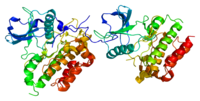
Photo from wikipedia
Mastocytosis is a composite group of heterogeneous diseases defined by the accumulation of abnormal mast cells (MCs) in various tissues. Cutaneous and bone marrow tissues are the most frequently infiltrated… Click to show full abstract
Mastocytosis is a composite group of heterogeneous diseases defined by the accumulation of abnormal mast cells (MCs) in various tissues. Cutaneous and bone marrow tissues are the most frequently infiltrated in adult patients with systemic mastocytosis (SM) (1) The CD30 (KI-1 antigen) receptor, belongings to the tumor necrosis factor receptor family, may have a role in mastocytosis. CD30 expression in MCs cytoplasm was reported in 2011 by Sotlar K et al. (2) in myeloid neoplasms, including SM. They observed a significant difference between the prevalence of CD30 positive immunostaining (CD30+ ) in advanced systemic mastocytosis (AdvSM) (85%) and in indolent systemic mastocytosis (ISM) (27%), which correlated with elevated serum tryptase levels (> 50 ng/mL). However, the relevance of CD30 expression of MCs in the maculopapular cutaneous lesions of SM patients is still unknown. This article is protected by copyright. All rights reserved.
Journal Title: Journal of the European Academy of Dermatology and Venereology
Year Published: 2019
Link to full text (if available)
Share on Social Media: Sign Up to like & get
recommendations!